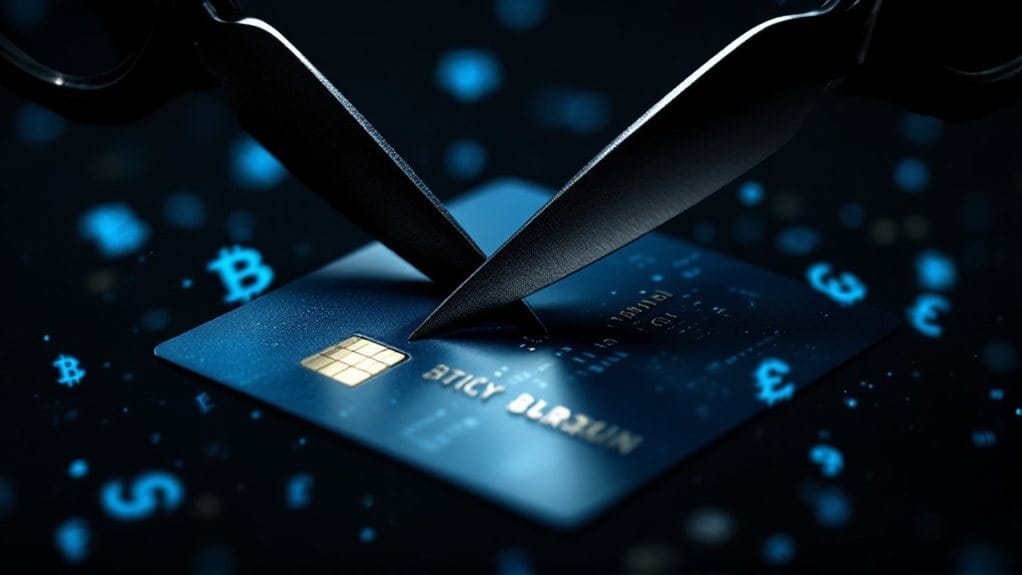Banks frequently block cryptocurrency transactions due to regulatory compliance requirements, security concerns, and fraud prevention measures. Financial institutions must adhere to strict anti-money laundering (AML) protocols and Know-Your-Customer (KYC) policies when processing digital asset purchases. The pseudonymous nature of cryptocurrencies, combined with their irreversible transactions and market volatility, creates significant risk management challenges for traditional banking systems. Understanding these restrictions reveals crucial insights about the evolving relationship between traditional finance and digital currencies.

Financial institutions worldwide are increasingly blocking cryptocurrency transactions, citing a complex web of regulatory concerns, security risks, and operational challenges. Banks face significant pressure to comply with anti-money laundering (AML) regulations and strict Know-Your-Customer (KYC) policies, making cryptocurrency transactions particularly problematic due to their pseudonymous nature and the difficulty in verifying the source of funds.
Banks’ resistance to crypto stems from mounting regulatory pressures and security concerns, creating a challenging environment for digital currency transactions.
The irreversible nature of blockchain transactions presents another critical concern for banks, as fraudulent activities and scams in the cryptocurrency space have led to substantial financial losses for consumers. High-profile hacks of cryptocurrency platforms and exchanges have further reinforced banks’ reluctance to facilitate these transactions, particularly given their potential exposure to chargeback requests and reputational damage. Specialized services are increasingly vital for banks to effectively detect and manage their cryptocurrency exposure.
In response to these challenges, many jurisdictions are developing regulatory frameworks to address cryptocurrency-related risks. The European Union’s Markets in Crypto Assets (MiCA) framework, for instance, implements stringent transparency requirements for crypto exchanges and token issuers, while the SEC in the United States continues to investigate and take action against unauthorized cryptocurrency operations. These regulations align with IRS requirements that classify crypto as property for taxation, requiring detailed transaction reporting.
Central banks are exploring alternative solutions through Central Bank Digital Currencies (CBDCs), with countries like China, India, and Brazil leading development efforts. These government-backed digital currencies aim to provide the benefits of blockchain technology while maintaining traditional financial oversight and control mechanisms, though critics argue this approach could compromise user privacy. Recent data shows that 0.01 percent of holders control 27% of all bitcoin in circulation, highlighting significant wealth concentration issues.
The impact of banking restrictions on cryptocurrency transactions extends beyond individual consumers to affect broader financial inclusion goals. While cryptocurrencies were initially promoted as a solution for unbanked populations, the reality is that most crypto platforms still require traditional bank accounts for operation, potentially perpetuating existing barriers to financial access.
Moreover, the technological infrastructure required for cryptocurrency adoption often exceeds the capabilities available in underserved communities, limiting its effectiveness as a tool for financial inclusion.
FAQs
How Can I Verify if My Bank Allows Cryptocurrency Purchases Before Attempting?
Customers can verify cryptocurrency purchase permissions through three primary methods:
- contacting their bank’s customer service directly to inquire about specific crypto policies,
- reviewing their account terms and conditions for digital currency restrictions,
- or logging into online banking to check pre-approved merchant categories.
Furthermore, customers should verify transaction limits and security protocols that may affect cryptocurrency purchases through their preferred exchange platforms.
What Alternative Payment Methods Work Best When Banks Block Crypto Transactions?
Digital wallets like Apple Pay and Google Pay offer seamless alternatives for cryptocurrency purchases, providing improved security and convenience.
Automated Clearing House (ACH) transfers enable direct bank-to-exchange funding, bypassing traditional card networks.
Buy Now, Pay Later services and prepaid cards present viable options for larger transactions, while hardware wallets and specialized crypto platforms facilitate direct cryptocurrency transactions without traditional banking intermediaries.
Additionally, peer-to-peer platforms and international payment processors can provide reliable solutions when conventional banking channels are restricted.
Can Banks Reverse Their Decision to Block Cryptocurrency Purchases?
Banks can reverse their cryptocurrency purchase restrictions based on several key factors, including evolving regulatory frameworks, improved risk management protocols, and market maturity.
The OCC’s Interpretive Letter 1183 has created a more permissive environment, allowing financial institutions to reassess their stance.
Furthermore, technological advancements in blockchain security and compliance measures, coupled with clearer regulatory guidance, enable banks to implement more nuanced approaches to cryptocurrency transactions rather than maintaining blanket bans.
Do International Banks Have Different Policies Regarding Cryptocurrency Transactions?
International banks maintain distinctly different policies on cryptocurrency transactions, influenced by their regional regulatory frameworks and risk assessment protocols.
While European banks often follow standardized EU guidelines, Asian institutions, particularly in Singapore and Japan, tend to adopt more progressive approaches.
U.S. banks navigate complex federal regulations, including OCC and FDIC requirements, while banks in emerging markets may implement more permissive policies to support financial inclusion through digital currencies.
Will Using Crypto Exchanges That Accept Bank Transfers Avoid Credit Card Blocks?
Using crypto exchanges that accept bank transfers effectively circumvents credit card blocks, as these platforms process transactions directly through banking systems rather than card networks.
While bank transfers typically involve longer processing times, ranging from 1-5 business days, they offer improved security features and lower transaction fees.
Major exchanges like Coinbase, Kraken, and Gemini provide seamless integration with traditional banking infrastructure through ACH and wire transfer options.









